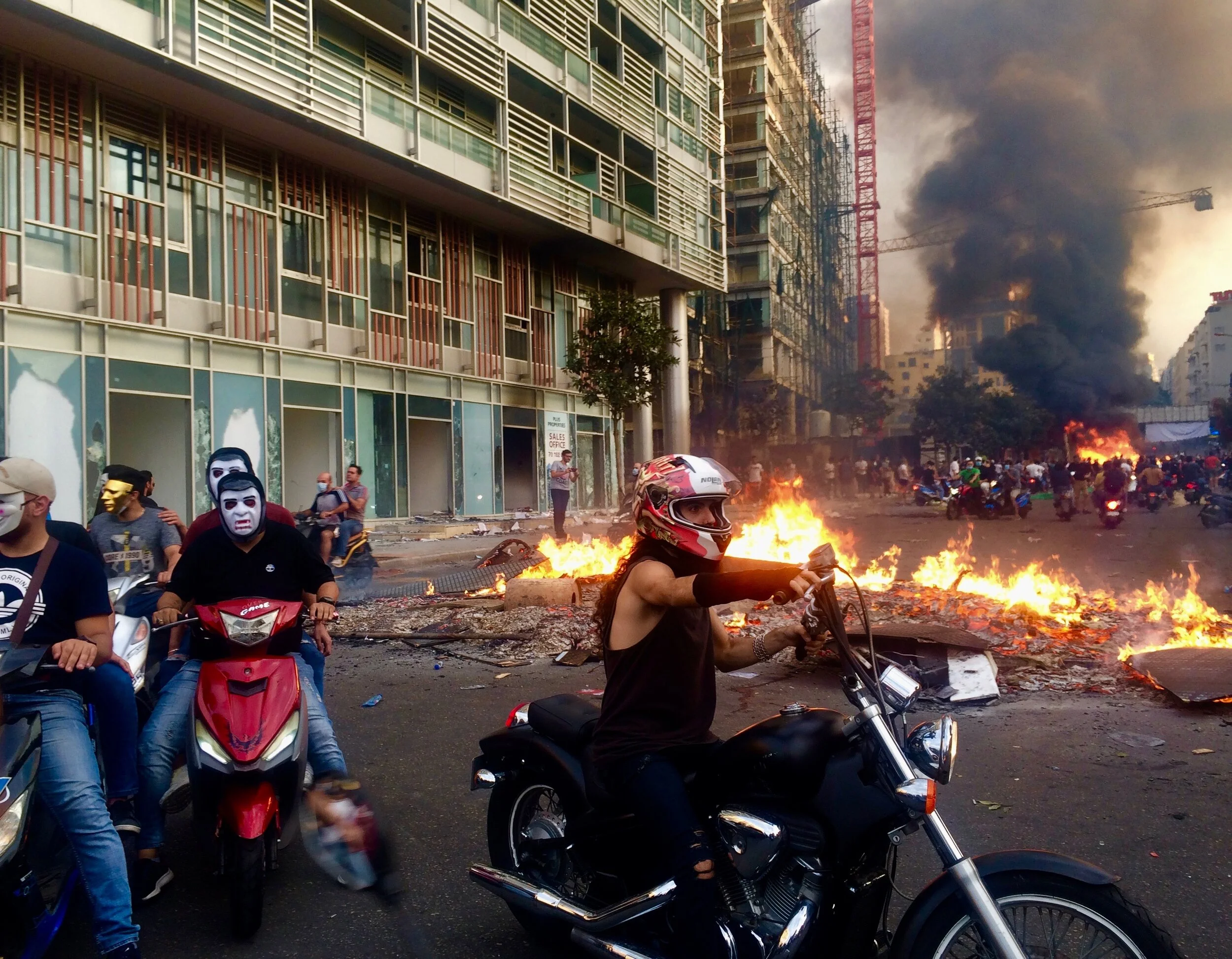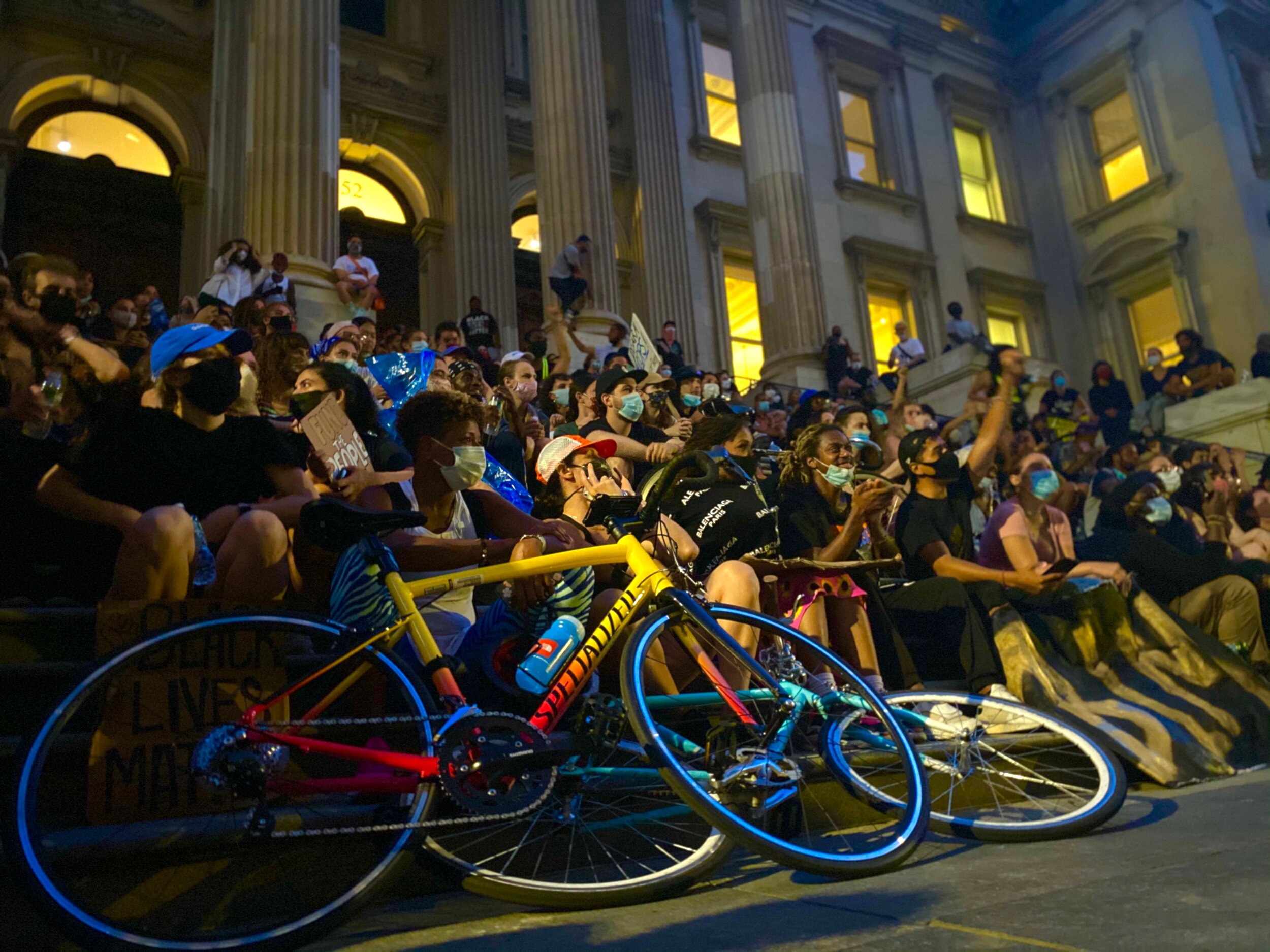The Liminal Space Between Party & Protest
by Angela Brussel
Photo courtesy of Angela Brussel. Beirut, Lebanon.
It began with noble intentions in New York. The city and the mayor were slated to negotiate next year’s fiscal budget and the people who had been rising up for nearly one month since the wanton slaughtering of George Floyd saw this as the perfect opportunity to localize their grievances, explicitly state their demands: Defund the police. Abolish them. But they would not crusade for the cause by marching or rallying. It was time, they decided, to take matters to the square. It was time, in other words, to occupy.
It is difficult for me to not look at this bitterly now, this joyous reclamation of public space, coming as I am off the heels of the revolution in Lebanon, which has backfired to a degree that not even the most cynical of us were expecting. I remember now the euphoria of the beginning. The motorbikes that would loop endlessly around us; the white noise of togetherness; the collapsible tents that became wooden structures of dissent; the settlement that turned into a city. All of it is now quashed by the merciless warlords of time past and I wince at the thought of a buoyant people being subjected to such a demoralizing force again.
Yet still, upon hearing about the occupation of the square beside City Hall, which is New York City’s seat of government, I rode my bike there with the cavalry on a current of not optimism, but curiosity. Maybe even a vague hopefulness that this time would be different. And the elation I felt all those months ago cracked open again in my chest. It was history unveiling itself, the future baring its teeth, and I was there, once again, to witness it in all its incipient glory.
The site, upon first viewing, was indeed a thing of beauty. Brass fanfare and percussion belted out “Amazing Grace”; a flurry of bodies broke into synchronized stepping; bikers guarded the south perimeter with pride on their faces, in their hands; deliberative whispers reached the wandering ear from the maze of people huddled by the dozens if not hundreds; a thousand hearts arced across the night as bikes surged forth in a chorus of bells that sounded like chimes; and the gears of the collective mind were so loud that the square became a clock ticking forward, grooving forth. I steadied myself. The new world, it seemed, had arrived.
Photo courtesy of Angela Brussel. NYC, New York.
Then the spatiotemporal double exposure took hold and I heard the chants of the Arab world, saw my keffiyeh wrapped comrades of what felt like a century ago, and braced myself for impact. Grew dizzy with the memory. This, I thought, will not last. But what exactly was it that wouldn’t? The activated consciousness, perhaps? The camaraderie and unison? Or the rugs and the futons and the chants?
I see myself now weaving through the twitching throng, inhaling the spray paint fumes and pot. The essential oils, sage, and menthol. And remember again why it was all so intoxicating: it was because it was incomplete, undergoing, undone. A society unfettered, mutating and transforming according to its own celebrated ambivalence and shifting wants. As the days persisted, though, it didn’t take long to devolve. It didn’t take long for the square to become, in many ways, a caricature of itself and I watched in dread as it did as though it were a film I had already seen. A lover in whom I had already discovered weakness. The movement, up until that point, which I thought had acquired such legitimacy and momentum, was being threatened. Disaffected youth smoked bongs behind tattered tarp, protesters viciously excoriated one another within earshot of the cops, and trash abounded.
When a friend asked me what the vibe was on the ground, I found myself in oscillation. Amateur hour chaos, I said. Splintering, factionalization, and degradation. But the glimpses of radical hope and enlightenment are bold and fierce. I was using the language of the revolution. And I meant it. But while I tried my utmost to give credit where it was due, there was a darkness I couldn’t shake. Something almost humiliating.
On budget reveal day, a time in which the people would finally learn whether or not their pleas to defund the police were acknowledged and met, it was made evident I wasn’t the only one who was skeptical. Activist group Warriors In The Garden, for instance, was appalled: “There is reading and there is violin and you’re chilling and camping with your toes in the grass three hours before the vote. This isn’t Coachella. This isn’t fucking Woodstock. We want 50 percent of that giant ass budget gone and we want it gone now.” I felt the tempo of the square suddenly change with these words and my mind along with it. The helicopter roared above, a horn groaned, and I felt very much like I was in love. But with what?
“While carnival lasts,” writes Russian philosopher Mikhail Bakhtin, “there is no other life outside it. During carnival time life is subject only to its laws, that is, the laws of its own freedom. It has a universal spirit; it is a special condition of the entire world, of the world's revival and renewal, in which all take part.”
Photo courtesy of Angela Brussel. NYC, New York.
Yes, this was it. It was a life outside officialdom. The process taking precedence over the product. An eddying, swirling microcosm of the world. But all along the thought haunted me that this was not a world in which I wanted to take part. Because while the people’s library and the action station and laundry land were all lofty, benevolent pursuits, the violinists posing in front of white backdrops for photographs, the protesters marching in hamster balls, and the people getting catatonically high detracted from what I thought was an otherwise righteous cause. And I feared that it delegitimized the movement entirely. That all the work grassroots organizations such as Warriors in the Garden and Street Riders were putting into the movement would be for naught.
The liminal space between party and protest, we lived in it in Lebanon. There was, in fact, major discord regarding the parameters of insurrection. Were fireworks appropriate? How about dabke? Drum circles? Drugs? The litany goes on. What would bolster the cause? What would stifle it? When I broached this with a friend, concerned that the rage was subsiding and the carnivalesque coming too much to the fore, he summarized it well, telling me that the people will sing and dance even when they are being persecuted and beat down. Even when they are enraged by the powers that be.
“This isn’t a party or a joy ride,” wrote one particularly militant protester referring to the weekly thousands-deep bike rides that rocked New York City all summer long in response to the pervasiveness of police brutality and the systematicness of racism. “It’s a protest and a call to action.” The revolutionary zeal was admirable. The soberness of the crusade, wholly understandable. But since when were the two modes of dissidence mutually exclusive? Furthermore, why are so many of us convinced that they need to be? And whose right is it to tell someone how to protest, how to celebrate, how to grieve?
“The utilitarian argument against fiestas, parades, carnivals, and general public merriment,” writes Rebecca Solnit in A Paradise Built In A Hell, “is that they produce nothing. But they do: they produce society. They renew the reasons why we might want to belong and the feeling that we do.”
It was this very notion of belonging that struck me most during the summer of protests in New York. This very notion that I considered as I watched from abroad what happened in the wake of the blast that shook Beirut. With near-apocalyptic relish, the same people I had stood alongside during the revolution took to the streets that the suited beasts had tried to wrest so murderously from them, but this time was different. Flags were supplanted by nooses, joyous chants abandoned in favor of wrathful battle cries, and euphoria jettisoned by the sheer force of sightless revenge. What were they hoping to achieve? was a common refrain from those who did not join them, but it is clear, in retrospect, that this is rather beside the point.
Photo courtesy of Angela Brussel. Beirut, Lebanon.
“They expected to watch the sunrise from inside parliament,” wrote a friend, “either shoulder to shoulder with ISF or standing on their corpses.” It is undeniable that this would be a most delicious achievement for those who spent so many years in pursuit of justice, so many years being humiliated by a ruling class that dragged them into the bowels of a most bitter and brutal hell. But this doesn’t quite get to the crux of it.
“It was not the achievement of the revolution,” writes Solnit when referencing Wordsworth’s appraisal of the French Revolution, “but its air of possibility that was so radiant.”
These were precisely the atmospheric conditions of the revolution’s commemoration just a few days ago. And precisely what America is careening toward. It is hardly about the achievement, hardly about the victory, or even the defeat, though there is no doubt that such outcomes mean something. But revolution and reform do not invariably overlap. Sometimes revolution serves as a precursor for reform, sometimes it negates its likelihood entirely, but there is a truth that remains no matter the circumstance and that is this: the time of revolution lives beyond the confines of time as we have historically understood it, in that liminal space where the world has just come into being, but is not yet aware of it. Where the child is a child, but does not yet know it.
“For the past twenty years, U.S. radicals have been speaking of “the politics of prefiguration”: of the idea that you can and must embody whatever liberty, justice, democracy you aspire to,” writes Solnit. “If you were protesting against alienation, isolation, and privatization, festivity in public didn’t merely demand but cultivated and reclaimed what was at risk.”
I consider this as I walk through the old, familiar places that bore witness to what felt, at the time, like genesis. The sky darkens, the church bells hauntingly clang, and fireworks are lit but cannot manage to move beyond a spark, let alone a bang.
What does it mean to be a body, I think. What does it mean for it to occupy a space? I move past the boarded-up mosque, where my memory of a thousand beaming faces quietly crashes into a frieze of blackness. Past the people chanting and blocking lonely roads. Reach backward while lunging forward in pursuit of, well, I am not sure what. Belonging. Justice. Maybe both. Until I see a mass of thrashing bodies breaking facades. I inch closer to this contained chaos, consider the persistent tug from the person in me who does not want any part of it, but still not entirely rid of the girl who, one year ago, was running ecstatically toward it. The riot police advance, gas billows, arms jerk in that familiar gesture of mutiny. Protesters wish one another a “happy anniversary.”
Photo courtesy of Angela Brussel. Beirut, Lebanon.
“Civil Society has moments when it falls in love with itself or celebrates its anniversaries when those ties again become enchantments rather than obligations,” writes Solnit. “That era when the connections were made, the possibilities were exciting, and joy came readily matters afterward. Memory of such moments becomes a resource to tap into through recollection and invocation, and celebrating those moments revives and reaffirms the emotions.”
For a moment, it is dazzling. For a moment, I am in love. Then gas throttles me, this time with very little relish for vanquishing its adversary. Almost begrudgingly, unconsciously, as though a reflex of muscle memory. And I stumble into the swollen night, swearing that this time is the last. That this is not the way to win the fight.
When I open my eyes, in that second before the gas forces them shut again, I see two boys. Their arms are draped around one another in brotherly content. They are comrades staggering half-blind into a paradise of their own making, and despite myself, I smile.
Angela Brussel is a writer and photographer based in Beirut whose nonfiction and fiction have appeared in Literary Hub, New Statesman, Catapult, The Awl, Nylon Magazine, Electric Literature, and The Wrong Quarterly, to name a few. Her website is here.






